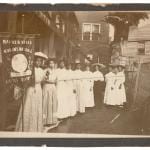He shows up in my spiritual biography of Charles Lindbergh, but I wish I knew more about a man who ran for president in the 1930s and 1940s. Not Franklin D. Roosevelt, but Norman Thomas, the Presbyterian pastor-turned-Socialist leader who lost to FDR four times—and to Herbert Hoover in 1928 and Harry Truman in 1948. He never received more than 2.2% of the popular vote (1932, when he was marked on more ballots than any American socialist not named Eugene Debs), but is a significant figure because of the unique intersection of his politics and his religion.
For if FDR could reasonably describe his political philosophy as that of “a Christian and a Democrat,” Norman Thomas was a Christian and a socialist.
The son of a Presbyterian minister, Thomas graduated from Princeton University and Union Theological Seminary and was himself ordained in 1911. Profoundly influenced by the Social Gospel, Thomas used his positions at East Harlem Presbyterian Church and a settlement house called the American Parish to minister to impoverished New Yorkers, many of them immigrants.
Unlike many other liberal Protestants, Thomas opposed American participation in World War I. “Not all conscientious objection is avowedly religious,” he insisted in August 1917, “nor is it confined to the relatively small sects which have incorporated it in their creeds.” But his own objection to war rested on a religious foundation:
The God of the religious conscientious objector, Jewish or Christian, is both stronger and more loving than the being recently discovered by H.G. Wells. He does not have to save Himself and His causes by using the devil’s means. Rather He waits for men to try His ways. We Christian conscientious objectors do not base our case on implicit obedience to one text even in that most revolutionary of documents, the Sermon on the Mount, but on the whole character and work of Jesus, who has conquered and is to conquer not by any might save Love and Truth. Churchmen nowadays say much of the “soldier’s Calvary” and “salvation through suffering.” If by sheer weight of agony the world is to be saved, long ago would salvation have come upon us. It is the spirit that counts, and the sublime sufferer on Calvary whose love and courage triumphed over shame and death did not receive His crown of martyrdom as an unfortunate incident in the attempt to kill as many of his enemies as possible.
His opposition to the war led Thomas to resign his pastorate and throw himself into the work of the pacifist Fellowship of Reconciliation. (About the same time, he also helped to found the American Civil Liberties Union.) But that debate also led him into the Socialist Party of America, running as its candidate first for offices in New York and then the presidency itself in 1928.
Four years later, he published a pamphlet explaining his political identity:
I am a Socialist because I believe that in Socialism, in this day and generation lies our best, indeed our only hope of plenty, peace and freedom. Or to put the matter negatively, I am a Socialist because I believe that in Socialism lies our only escape from a long cycle of poverty, dictatorship and war.
To his mind, neither major party offered a viable alternative. The “Tory” paradise of “the Coolidge epoch” was “a sorry place at best,” marked by “frantic gamblers’ prosperity” and mass exploitation. And while he thought of the New Deal as the most practical reform given “the limitations of the American political and economic situation,” it “brought no sense of permanence or security to masses of Americans who suffer all the pangs of poverty in the midst of potential abundance.” By leaving in place “the principle of production for profit,” Roosevelt did no more than replace “private capitalism by state capitalism.”
(“We have decided to call ourselves ‘The Doubting Thomases,’” explained supporters at Hunter College in 1928, alluding to their candidate’s religious background, “because we take with many grains of salt the promises of the two old parties.”)
Thomas’ version of socialism emphasized “social ownership of the principal means of production and distribution” and a collective decision to “not accept poverty in the midst of potential abundance.” But after initially supporting the Russian Revolution, he broke sharply with the Stalinist version of collectivization established in the Soviet Union, where “there is so little sign that the dictatorship is withering away. That dictatorship still imposes a rigid regimentation and at times prostitutes justice to terrorism… In this sort of justice lies neither security nor liberty for the new society.”
As importantly, Thomas’ socialism was bound up with his pacifism. “Modern wars arise out of the clash of nations for power and profit,” he wrote in 1932. “We cannot make peace secure or glorious under the loyalties of the institutions of capitalist-nationalism.” As the seeds for a second world war began to germinate in 1938, Thomas convinced the Socialist Party to found the Keep America Out of War Congress, then led it into an occasional partnership with the America First Committee in 1940-41, even though that group’s supporters included conservatives like Sears Roebuck chairman Robert Wood, Chicago Tribune publisher Robert McCormick, and Charles Lindbergh.
That alliance fell apart after Lindbergh, in a September 1941 speech in Des Moines, Iowa, blamed Jews for pushing a “pro-war policy” that was dangerous “both for us and for them.” “I honestly don’t think Lindbergh is an anti-Semite,” Thomas responded, “but I think he is a great idiot.” In the end, the socialist leader broke with fellow pacifists to support the campaign against Hitler—though he publicly criticized FDR’s decision to intern over a hundred thousand Japanese Americans, which he thought “approximates the totalitarian theory of justice practiced by the Nazis in their treatment of the Jews.”
So what role did Christianity play in shaping Thomas’ socialism? “Karl Marx Would Doubtless Call Him a Rank Heretic,” ran the headline in a 1932 Hartford Courant profile of Thomas. Though the candidate had formally resigned his ordination a year earlier, “he is still a minister, converting capitalists, and they parade to his lectures as though to a church.” Or as biographer Raymond Gregory puts it, the “social gospel movement still stirred Thomas’ soul.”
But Thomas himself generally deemphasized Christianity in his political rhetoric. “The progressive… knows that in no proper sense is religion an issue in this campaign,” he told supporters in Pennsylvania in 1928. “The great issue of Progressives still fall under the heads of plenty, peace and freedom. They have to do with our ability to make government our servant rather than the servant of special privilege.” Four years later, his pamphlet on socialism made no meaningful references to religion. “If a man’s Christianity makes him a Socialist, well and good,” he had written a year before, in an essay published as part of his book As I See It. “But let him remember it does not absolve him from an understanding of economic forces and programs in which non-Christians may unite with him. Let him prove the values [of] his Christianity… by his service in the Socialist movement, not by trying to substitute Mark for Marx.”
Indeed, it seems clear that Thomas himself drifted away from Christianity over time. In 2015 World magazine published an article by Western writer John R. Erickson, who (as a Harvard Divinity School student) had interviewed Thomas in 1967, the year before the activist’s death. Erickson concluded that Thomas had broken with the church as early as 1921, largely because of the theological problem of a God who would allow the mass suffering of the Great War and its aftermath. “I was very well satisfied with the kind of Christianity” he encountered in seminary and heard from the likes of Harry Emerson Fosdick, Thomas recalled, but he came to feel
that I could not accept what I had once very earnestly and warmly accepted—what I understood as the Christian identification of a God of power and a God of love. I had no desire to spread my doubts among other people. I regretted them very much. The doubts did not make me an atheist. They left me very puzzled, and the great desire of my life was a concept of God which could reconcile these two beliefs.
Norman Thomas “had lost his father’s faith,” concludes Gregory, “but beneath it all, he wished he had not.”
That interview with Erickson, according to World editor Marvin Olasky, demonstrated the fallacy of trying “to erect a hopeful ideology on a vague theology.” And during an election year in which “court evangelicals” like Franklin Graham and James Dobson are warning the faithful of the dangers of socialism, I suspect that some of you are hearing Thomas’ story as a cautionary tale.
But those of us who cling to Christian faith in the midst of theological paradox can still find helpful the “hopeful ideology” of a socialist like Norman Thomas.
First, Thomas challenges Christians to make their faith in Christ active in love of impoverished, exploited, and alienated neighbors. “The generalizations [of Christianity] are meaningless,” he wrote in As I See It, “unless worked out in a world where there is one justice for the rich and another for the poor, where gross inequalities of wealth and poverty have little relation to need or deed and none at all to brotherhood.” At a time when the stresses of COVID-19 are deepening economic inequalities already as severe as what Thomas criticized during the Great Depression, Christians should not accept rich man’s justice dressed up in religious generalizations.
But we will undoubtedly disagree about how best to work out our faith in the midst of injustice and inequality. So whether or not you share Thomas’ commitment to “social ownership,” let some of his earlier words convict you of the importance of respecting individual conscience and protecting civil liberties. In his 1917 apology for conscientious objection, Thomas made a larger argument for “the social value of heresy.” For the Christian church was strongest where it asserted “the responsibility of conscience to God” rather than the state, and the state could only remain democratic if it protected the rights of the minority: “The heretic may be very irritating, he may be decidedly wrong, but the attempt to choke heresy or dissent from the dominant opinion by coercing conscience is an incalculable danger to society.”
I’m not sure which challenge is more daunting at this point in American history. But even if he couldn’t resolve his central theological problem, a presidential candidate who never received even a million votes would urge us to reach for seemingly impossible goals. In its 1932 profile, the Hartford Courant understood that Norman Thomas “can be correctly classified as neither a preacher nor politician. Familiar phrases of both pulpit and soapbox are missing when this tall speaker addresses his audiences. He is rather a crusader—a leader of lost causes.”













